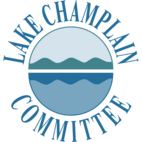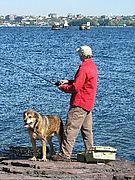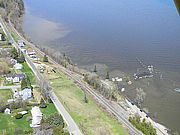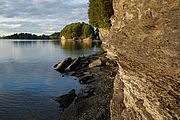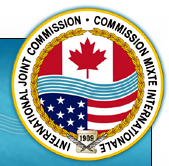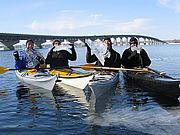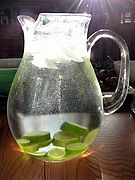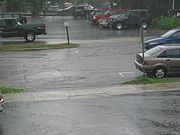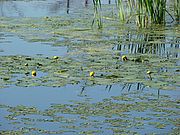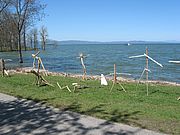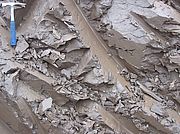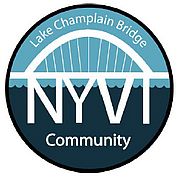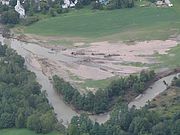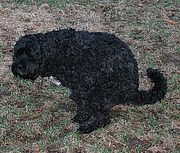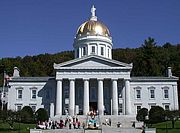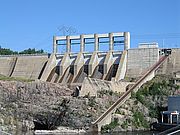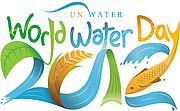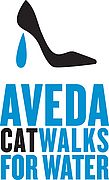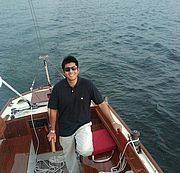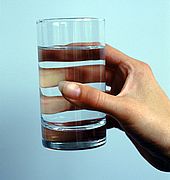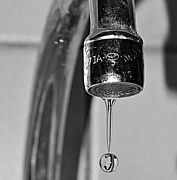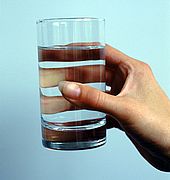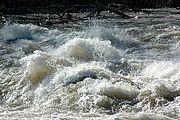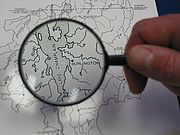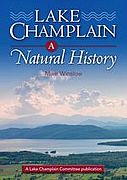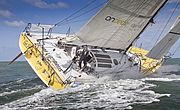Go out for Earth Day – outside that is. Take a stroll, a hike, a bike ride, a paddle, a run, or go fishing in the great outdoors. Breath some fresh air, take in the sunshine – or the rain, watch the stars. Commune with nature. Getting out into the greenery can boost your mood and your health. Research indicates that spending time in forests and nature areas helps people recover from stress and fatigue. MORE Read...
News from Selected Month
The International Joint Commission (IJC) has been asked to develop a plan of study concerning the record flooding of Lake Champlain and its tributaries, and of the Richelieu River which occurred in Spring 2011. In letters from the Governments of the United States and Canada, IJC is being asked to develop a study proposal which would examine the causes and impacts of flooding, as well as the full range of measures to prepare for, prevent and mitigate such impacts. MORE Read...
LCC’s work depends on the financial support of people and businesses that care about the lake and invest in our efforts to protect water quality, safeguard natural habitats and enhance recreational access. MORE Read...
On March 9, 2012 a field hearing of the House Agriculture Committee convened in Saranac Lake, NY to hear from agriculture producers on their views of the Federal Farm Bill. Every five years Congress has to reauthorize the federal Farm Bill. The current version expires at the end of September, so this year’s reauthorization coincides with an election year. The labyrinthine complexities of the bill are stupefying, but three areas stand out in their importance to protecting water quality in Lake Champlain: conservation programs, supply management, and support for diversified agriculture. MORE Read...
The International Joint Commission (IJC) will hold public hearings about a recently completed report identifying critical source areas of phosphorus loading to Missisquoi Bay. The hearings will be held at 7 PM on Tuesday May 1 at the St. Armand Quebec Community Center and Wednesday May 2 at the Swanton Vermont Village Municipal Complex. MORE Read...
Even if air temperatures seem balmy, the lake takes much longer to warm up. Additionally, strong currents and springtime debris are potential marine hazards this time of year. Lake Champlain temperatures are still in the 30s. If you are immersed in water that cold, exhaustion and unconsciousness can set in after 15 minutes. MORE Read...
As the weather warms we are more likely to turn to a nice cold drink of water to quench our thirst on a hot afternoon. Fill a pitcher and keep it in the refrigerator rather than running the tap until the water cools every time you need a drink. Doing so saves energy, saves water, and helps protect Lake Champlain. MORE Read...
Pollution loading from developed lands remains one of the most difficult sources of phosphorus to control. The Lake Champlain Basin Program (LCBP) recently released two requests for proposals for studies that could improve management of developed lands in the New York portion of the watershed. One project would outline a program to better manage New York back roads. MORE Read...
The Lake Champlain Committee has been working with the Vermont Agency of Natural Resources to help map aquatic natural resources in Vermont. The work is part of a larger project to produce a statewide map and supporting database identifying the lands and waters that support high priority ecosystems, natural communities, and habitats worthy of conservation or restoration. MORE Read...
Spring is a great time for finding driftwood on the shores of Lake Champlain. The wood can come from trees along forested shorelines that were undermined by wind and wave erosion, but more commonly it is delivered by streams and rivers entering the lake. Once in the lake, driftwood can remain afloat for long periods of time. In Oregon’s Crater Lake one piece of 9 meter long driftwood known as ‘the Old Man of the Lake’ has been floating around since at least 1896. MORE Read...
Delve into the rich history of clay soils and the agricultural, engineering, and environmental challenges they pose at the Champlain Valley Clay Symposium on June 1. MORE Read...
Activities will span the weekend and both sides of the bridge, with programs taking place at Chimney Point and Crown Point historic sites. Stop by LCC's table for paper and paint and share your artistic vision of a clean lake. Other celebration events tentatively include a gala opening ceremony, hometown grand parade from Vermont to New York, a Farmers' Market, fireworks and more! MORE Read...
Join us for a beginner-intermediate conference on river science issues specifically designed for municipal officials, consultants, contractors, legislators, curious citizens, watershed group members and farmers. Using case studies, speakers will discuss the various aspects of what makes rivers stable - or unstable - such as: gravel extraction, roads and bridges, agricultural practices, downtown development, stormwater, dams and flood plains. MORE Read...
Way to Go is an annual program co-founded by LCC to promote the use of cheaper, healthier, earth-friendly alternatives to driving alone. Individuals, businesses, schools, and organizations can all participate. Sign up online and your pollution, gas and money savings will be calculated and you'll be entered into a drawing for great prizes! MORE Read...
Be a part of LCC's springtime effort to remove dog doo from our sidewalks and recreation paths on April Stools Day - April 1, 2012, or anytime that suits your schedule. Pet poop contains bacteria and excess nutrients that are bad for our health and waterways. Dog doo left on hard surfaces washes into stormdrains any time the snow melts or it rains. From there it enters streams or the lake from which almost 200,000 people get their drinking water. MORE Read...
Earlier this month we reported that in February, the Vermont House passed a three-year moratorium on the gas extraction procedure known as fracking. Now that the cross-over deadline has passed, Senate and House Committees will be spending more time on bills that were passed by the opposite side. The fracking bill is currently in the Senate Natural Resources Committee and testimony will begin on Thursday, March 22. LCC supports a fracking moratorium in the Champlain watershed. MORE Read...
The proposal to install a 1,000-megawatt transmission line on the bottom of Lake Champlain to transport hydro and wind power from Canada to the New York City market continues to move forward. At the end of February the project proponent, Transmission Developers Inc. (TDI), said it had reached agreements with numerous state agencies, local governments and environmental groups on many aspects of the project. MORE Read...
Celebrate World Water Day with leaders and individuals around the globe on March 22. World Water Day has been recognized by the United Nations since 1993 as a time to focus attention on the importance of water, and advocacy for the sustainable management of freshwater resources. This year’s theme is Water and Food security. Learn why “the world is thirsty because we are hungry” and how signing up for a CSA – Community Supported Agriculture – can reduce your water footprint and support your local community. MORE Read...
The winter of 2011-12 will go down as the second warmest on record (behind only 2001-02) in the Champlain Valley. Meteorological winter includes the months of December, January, and February. Meteorologists report that low air pressure associated with the North Atlantic portion of the Arctic Oscillation kept the jet stream from pushing south and bottled up the Arctic air masses, letting warm southern air flood our region. MORE Read...
Stylists and students from O'Briens AVEDA Institute and O'Briens' salons are teaming up to produce a fun night of hair and fashion to raise money for LCC! Students will create looks based on themes of Earth, Air, Fire and Water and dress each model from head to toe in recycled garments. Doors open at 7:00 PM and the show starts at 8:00 on Friday, April 27 at Club Venue in Colchester on Porter's Point Road. MORE Read...
Give some TLC to your body and the lake at O'Briens AVEDA Institute Spa Night. For a $20 donation you can choose up to four services from manicures and makeup to facials and massage. All the money raised will go to LCC. MORE Read...
Dan Jacobs has donated over 25 hours of his time with the Lake Champlain Committee (LCC) since August 2011, assisting with organization mailings and member communication pieces. Jacobs, a Burlington, Vermont resident, began volunteering to help Lake Champlain, as well as expand his area network. “Summer is when I appreciate the lake the most, sailing near Converse Bay, swimming at Juniper Island and biking along the Causeway,” says Jacobs. MORE Read...
On a recent winter day my family was exploring some woodlands along the shore of a river near Lake Champlain. My daughter exclaimed about the huge birds in the trees on the opposite side. Three bald eagles sat regally staring out over the landscape. Bald eagles were once nearly unheard of in the skies of our region. Now, they are following in the path of osprey populations as their numbers steadily increase. MORE Read...
The Plattsburgh Press Republican recently reported that the spillway at the 90-year old Mead Dam, which supplies water for the city, does not meet state regulations and must be reconstructed. Like many places throughout the country, Plattsburgh faces an aging water supply system. The American Society of Civil Engineers recently gave our nation’s drinking water infrastructure a grade of D-. MORE Read...
LCC is joining with the EPA’s WaterSense Program to promote Fix a Leak Week. Fix a Leak Week encourages Americans to find and fix water leaks at homes and businesses. “Leaks can account for more than 10,000 gallons of water loss in an average home every year—enough water to wash nearly ten months’ worth of laundry,” said Lori Fisher, LCC Executive Director. MORE Read...
Lake Champlain Committee Staff Scientist Mike Winslow was featured on WCAX's evening news to discuss our aging national and local water infrastructure systems. Watch the interview on our website. MORE Read...
The past year will forever be remembered as the year of flooding. Record high lake levels in the spring were followed by Tropical Storm Irene in the late-summer. With such tremendous increases in the amount of water in the lake and in our rivers, how did aquatic organisms survive the disasters? MORE Read...
Watershed for Every Classroom is a year-long, 11-day professional development experience for K-12 teachers. In a supportive, collaborative, and fun environment, we explore the many different ecological and cultural stories of the Lake Champlain Basin. Teachers test for water quality, visit farms, paddle waterways, look out over mountaintops, tour urban areas, and much more as they learn ways to engage students in the many issues that face our watershed. MORE Read...
Look in LCC’s Award-winning book! Why is ice so hard and slippery? Does Lake Champlain produce lake-affect snow? Why does fog form over the lake on cold days? What is the probability that Lake Champlain will freeze over in any year? MORE Read...
On Thursday March 15, Brad Van Liew, the only American to win a solo around the world sailboat race will speak at the Main Street Landing Film House, 60 Lake Street in Burlington, Vermont. The event is the Spring Ice Breaker of The Regatta for Lake Champlain, one of the Lake Champlain Committee’s fundraising partners. More people have traveled in space than have sailed around the globe alone. Brad Van Liew is one of only 15 Americans to do so. MORE Read...
